
Volume 1812
Georges Dodds'
The Ape-Man: his Kith and Kin
A collection of texts which prepared the advent of Tarzan of the Apes by Edgar Rice Burroughs
Presents
http://www.erbzine.com/mag18/berthet.htm

| Chapter I. | The Colony. |
| Chapter II. | The Chinaman Yaw. |
| Chapter III. | The Negress . |
| Chapter IV. | The Tiger. |
| Chapter V. | The Doctor. |
| Chapter VI. | The Bimbang. GO TO PART II for Chapters VI-X |
| Chapter VII. | The Chinese Garden. |
| Chapter VIII. | The Orang-Outang. |
| Chapter IX. | The Visit. |
| Chapter X. | The Capture. |
| Chapter XI. | The Fontaine-des- Laves. GO TO PART III for Chapters XI-XVI |
| Chapter XII. | Bereavement. |
| Chapter XIII. | The Pursuit. |
| Chapter XIV. | Found and Lost. |
| Chapter XV. | The Forest. |
| Chapter XVI. | The Return. |
| Chapter XVII. | The Father's Resolve. GO TO PART IV for Chapters XVII-End |
| Chapter XVIII. | Discovery. |
| Chapter XIX. | Return Home. |
| Chapter XX. | The Expedition |
| Chapter XXI. | Fresh Danger. |
| Chapter XXII. | Deliverance. |
| Chapter XXIII. | Conclusion. |
Even in the present day Sumatra, for whose commerce the English and Dutch so long disputed, is little known to Europeans. Except certain ports at which vessels that coast along the shores of the Archipelago touch, it is rarely visited by travellers. The interior of the country, besides being protected by high volcanic mountains and impenetrable. forests, is inhabited by savage, warlike nations, jealous of their independence, and who, though not much addicted to cannibalism, most assuredly would not have the least scruple in devouring any tourists who might be desirous of studying their manners and customs. Therefore, except a few intrepid Englishmen who were not to be daunted by such a risk, no one has succeeded in penetrating into the central regions of the island, and they will remain unexplored till the Dutch, who proceed in this part of the world, as they do everywhere else, with the prudence and gravity of their national character, have contrived to render these people, who now resist every advance of civilization, a little more tractable.
Yet Sumatra would seem, at first sight, to offer the attraction of grand and picturesque scenery, and to possess natural riches which might excite the wonder of the traveller or the avidity of the trader. It is nearly 1050 miles long and 165 miles broad. In this immense territory almost all the productions of the most favoured countries in the world may be met with. The sea that surrounds it is beautiful and calm during the greater part of the year, and numerous rivers, flowing down from the interior, form excellent harbours at many different points. Although the equinoctial line divides Sumatra almost in half, the climate is temperate on the mountains in the centre of the island. These mountains, several of which are active volcanoes, contain precious metals, principally gold, which is worked in a very imperfect way by the Malays. Large lakes supply inexhaustible streams of fresh and pure water.
In the forests the most valuable trees for dyeing and cabinet-work abound. Around the houses fine rice plantations produce the best rice in the world; in every direction there are fields of indigo, pepper, and sugar, and luxuriant plantations, where the clove-tree, the cinnamon, the camphor-tree, the benzoin, seem to rival the cocoanut, the guava, the banana, the orange, and the shaddock, in productiveness and beauty. During six months of the year not a drop of rain falls, the sun shines constantly in an azure sky. Thus, at first sight, life appears pleasant and agreeable in this fruitful land, with its thick, shady foliage and sweet-smelling trees and flowers.
Unfortunately there is a dark side to every picture; in Sumatra, as is often the case, each apparent advantage conceals a deadly danger. The sea, usually so calm and alluring, is subject to typhoons, which agitate it to its very depths. Even in calm weather the European navigator is liable to be surprised at night by Malay pirates, who attack him in their long, narrow, one-decked boats, called flying proas, and murder the" crew and take possession of the cargo. And, when there are no pirates, there are formidable bands of no less audacious sharks wandering incessantly around the vessel. The island itself pays very dearly for its picturesque beauty and fertility. The volcanoes frequently cause terrible earthquakes, which overturn the most substantial buildings. The pleasant rivers are haunted by monstrous crocodiles, ready to snap up the unwary traveller. The virgin forests abound with wild buffaloes, elephants, tigers, and other monsters more terrible still. A thousand dangerous reptiles -- among others, the python and the venomous cobra --- glide along in the plantations, while the very dwellings are invaded by clouds of insects, which, in tropical climates, seem created expressly to torment the human race. Moreover, the immense masses of decaying vegetation in the marshes and woods emit miasmas, which, in spite of the perfume of the flowers and spice- trees, poison the atmosphere. The length of human life therefore at Sumatra seldom exceeds sixty years, and the western coast of the island is particularly dreaded by vessels in port, and has received from the sailors the ill-omened name of the plague-coast, from its deadly ravages among the crews.
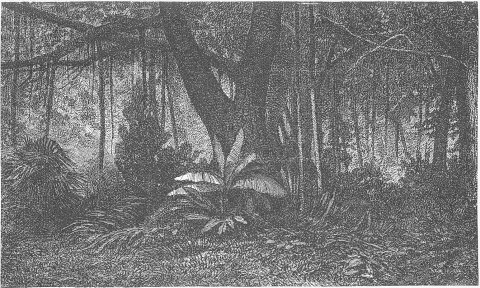
The place of which we speak was, at the commencement of this century, a little Dutch colony of slight importance. New Drontheim, as this colony was called, was only a trading settlement, to which a few Batavian ships came at certain seasons to seek the productions of the country. It consisted of a harbour, small, but deep and very safe, formed by a river, and sheltered from the waves of the open sea by a little island of coral.
At the mouth of the river there was a fort, armed with certain rusty cannon. Some fifty men, half Dutch, half natives of Java, sufficed for the defence of this post.
Under the shelter of this semblance of a fort, which crowns the summit of the cliff, stretches the village of New Drontheim. The word village, however, must not lead us to picture to ourselves one of our own villages, with houses standing in groups and lying thickly around the parish-church. The houses of this village were detached, according to the custom of the country, and so carefully sheltered by large trees that they were not visible from a distance. Some, of brick, were built in the Chinese fashion; others, apparently only huts of bamboo or cane, were raised from the ground on wooden posts. All the rooms were on the ground-floor, as the earthquakes would overthrow higher and more solid buildings in a minute.
The population of this village, thus scattered over a large space, was composed of almost as many different races as there were houses.
In the first place, a pretty house, half-wood, half- brick, situated in the midst of an evergreen wood, at a little distance from the shore, bore the grand name of the Governor's Palace; it was there, in fact, that the Dutch officer in command of the garrison usually resided, rather than at an unhealthy and uncomfortable dwelling provided for him in the fort at the top of the cliff. The soldiers, following the example of their chief, installed themselves in the village, and lived there when they were not on duty, as was frequently the case; for, except five or six of them who mounted guard by turns in the battery, they had little to do at New Drontheim.
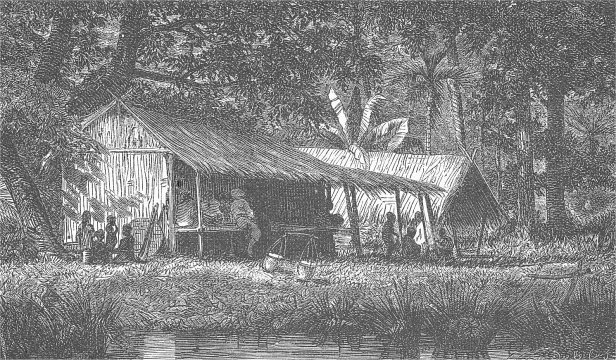
The white colonists were less numerous; they consisted of a few English, French, and Portuguese sailors, deserters for the most part, who had provided themselves with families by marrying the yellow, copper-coloured, or black women of the country. In spite of the great variety of races, manners, and languages, the inhabitants of New Drontheim lived very peaceably, and these very different nationalities blended well together; although now and then a few blows with a kris, or knife, were bestowed in private quarrels, nobody taking much notice of the matter.
At the furthest extremity of the colony, that is to say, two or three miles from the fort, was a solitary dwelling, larger and more splendid than the rest, the wonder of the country. It was built on a kind of terrace, half-way up an eminence, forming part of the chain of volcanic mountains which extend over the island. Thanks to this situation, it had little to fear from the pestilential mist which rises every morning near the sea in Sumatra --- a mist which for hours resists the powerful action of the sun, and seems to be the principal cause of the unhealthiness of the island. The whole of the terrace was taken up with the buildings, courts, and gardens of the farm. Where it was not protected by inaccessible rocks, it was surrounded by strong palings of iron-wood, rendered impenetrable by hedges of aloes and other prickly shrubs.
The path up to it lay through an avenue of tamarinds, whose thick and majestic foliage furnished the shade so necessary under that fiery sky. At the foot of the hill lay extensive rice- grounds, well-cultivated fields, and magnificent plantations, which apparently belonged to the house. Facing the avenue was the master's dwelling, an elegant Chinese building. Contrary to the usual custom, this house had one story above the ground-floor; but as it was of wood, covered only with that wonderful stucco in imitation of marble of which the Chinese have the secret, it had not much to fear from subterranean convulsions. Beautiful cocoanut- trees raised their leafy fans over its roof, and a veranda or outside gallery, adorned with flowers and climbing plants, stretched along the front. From the top of this veranda, not only the servants and the work-people in the court and in the neighbouring fields might be watched, but an extensive view enjoyed of the valley, bounded by a virgin forest, of the river, of the mountains of the interior, the village of New Drontheim, the fort, the anchorage, and of the vast tracts of the ocean, whose blue waters blended with the sky in the distance.
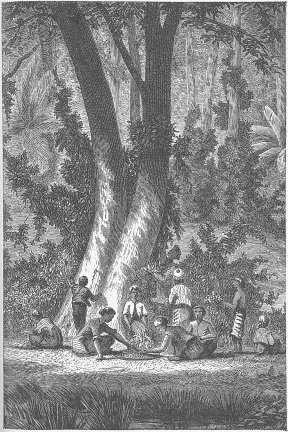
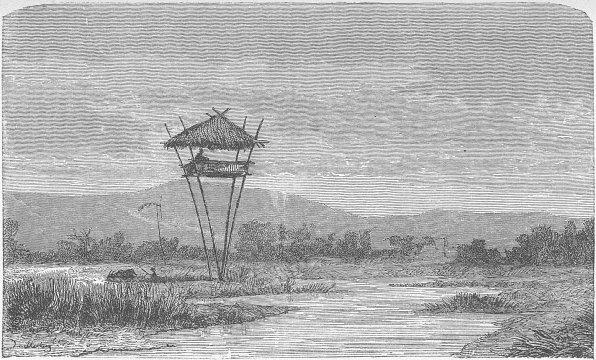
Her son Edward, a fine boy of eight, and her husband, whom she adored, took the place of all she had lost. She never complained of the change in her lot; far otherwise, her dear ones always found her ready to welcome them with a smile.
Two other persons, Mrs. Surrey, Palmer's sister, and Anna Surrey, her daughter, completed the settler's family. Mrs. Surrey, it was said, was the widow of an English officer of high rank, who had been killed in a skirmish with the Hindoos. Left alone in the world, with a child of tender years, she had sought the protection of her brother's roof, and both mother and daughter had found in him all the affection they deserved. In the house Mrs. Surrey took upon herself the duties of a good housewife; it was she who directed all the household arrangements, prevented waste, and watched over the general comfort of the family. Her sister-in-law, the graceful and indolent Creole, had long ceased to dispute her position in the family, the duties of which Mrs. Surrey discharged with so much ability.
In return, Elizabeth reserved to herself the care of Edward's and Anna's education. While her husband was directing the work-people out of doors, she, with the help of the few books which formed their library, gave her son and niece the instruction necessary to fit them for civilised life. Anna, two years older than Edward, was gentle, very intelligent, and profited greatly by the instructions of her kind aunt. Edward, on the contrary, made little progress, and greatly vexed his indulgent teacher. He did not like study, and cared for nothing except running about the country, exposed to a thousand dangers, or climbing the rocks, or shooting with a bow and arrows, or following the Chinese or Malay servants about the plantations. It was in vain that Anna, of whom he was very fond, and who had acquired a great influence over him, came to the help of his mother's authority, and tried to make the idle scholar amend his ways; he was always promising to behave better, but it was never long before all his promises were forgotten, and he was indulging again in one of his favourite amusements.
It was now the month of September, near the end of the dry monsoon in Sumatra. And on the day that this story begins, the sky, usually so serene, had been disturbed by thick clouds, and when the sun was setting, dark mists hung over its dazzling disk, though as yet they did not seem to threaten a storm. For all that, the heat was still oppressive, and the inhabitants of our more northern climates would have been overwhelmed by the temperature of a Sumatran autumn.
Mr. Palmer, in a planter's dress, with a large straw hat, jacket, and trousers of nankeen, was standing on the veranda of his house with a telescope in his hand, and observing carefully a little black speck that was just visible on the sea in the distance. At his side, in a large cane chair, was Elizabeth, looking weak and languid. Dressed entirely in white, she was covered with a large gauze veil to keep off the mosquitoes; but this was so transparent that it did not conceal her graceful form, her delicate features, or her eyes so full of love and tenderness when she fixed them on her husband. The temperature was not the only cause of the paleness which marked the beautiful Creole. Mrs. Palmer, like the rest of her family, had been born in India, and had been accustomed to the heat of a tropical country from her birth. But at last the hurtful influence of the climate of the island had affected her frail constitution. Elizabeth frequently suffered from a nervous fever, and the Dutch doctor of New Drontheim had in vain exhausted all the resources of his science in the attempt to subdue it; and at that very time she had hardly recovered from a violent attack that she had had the previous night, although she tried hard to hide her weakness and weariness from her husband.
At the other end of the veranda little Anna Surrey, seated on an easy chair, was holding a lesson-book in her hand. She was dressed in white, like her aunt, and, like her aunt, she wore a gauze veil on account of the mosquitoes. But, throwing aside the troublesome thing, the pretty child left her sunburnt face and neck uncovered, while a light sea-breeze that began to blow played in the silky ringlets of her hair. She was bending over her book, and her lips moved in silence as if she were learning a lesson. Still she seemed in an absent mood, and some secret reason seemed to prevent her from studying with her usual application. From time to time she looked at her aunt, and tried to anticipate every wish of the invalid; but still oftener she looked intently down the avenue which stretched away in front of the house. Evidently she expected someone who did not come, and her uneasiness increased every minute, although she did not dare to express it.
At last Palmer shut up his glass, and said:
"The ship carries the Dutch flag, and has just doubled the point. . . . No doubt this vessel is one of those that generally come here from Batavia, at this time of the year, to take in a cargo of spices. In less than an hour it will come to anchor, and we shall get some news."
Elizabeth answered with a forced smile:
"Ah, my dear! what do news matter to us now? --- we have long ago broken with the rest of the world! Do not think of anything, Richard, but of selling your crops to the captain of the ship just entering the harbour, and do not worry yourself about what may be passing at the other end of the world."
Richard took out his glass again, and began to look out into the distance.
But little Anna could not control her uneasiness; the book she held in her hand was quite forgotten. Thinking the opportunity a favourable one for venturing a question, she glided to Mrs. Palmer, and asked her timidly:
"Dear aunt, where is Cousin Edward?"
"He is gone with the black woman to see the betel gathered," answered Elizabeth absently.
"And are not the betel-fields near the forest?"
"Certainly --- but what do you mean?"
"I mean that it will soon be dark, and then ---"
A sign from Elizabeth silenced the young girl, as Palmer approached them.
"There, the ship is entering the roads," he said thoughtfully; "and Major Grudmann is sending out his pinnace first, undoubtedly to hail her. . . . Really, my dear, I shall go down to New Drontheim to find out what is happening; I will go first to the doctor to ask him to come and see you, for you do not seem at all well."
Elizabeth did not try to detain him any longer, but contented herself with begging him to return quickly. Richard Palmer was leaving the veranda to start on his walk, when a new incident attracted his attention.
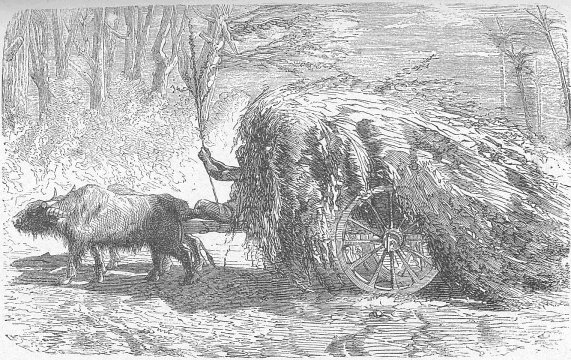
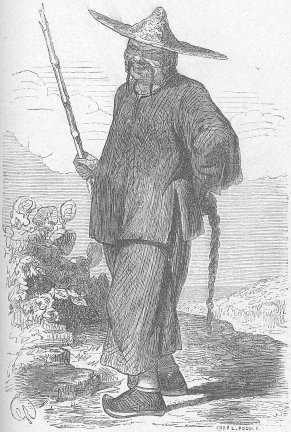
Anna no sooner saw him than she called to him, and the Chinaman came, waddling and grinning as usual. Then Miss Surrey, leaning over tile railing of the gallery, and using a kind of patois in use among the people of the colony, and composed of all kinds of languages, asked him if he had not seen Edward and the black woman Maria in the plantations.
The fellow nodded his head.
"Yes, yes," he answered; "Yaw has seen Edward and Maria."
"Where were they? where were they going?" asked Anna anxiously.
"By the forest. Maria not want to go, Edward did want. Edward is small boy, but he be master, and they are gone."
"Into the forest!" cried Anna, clasping her hands; "but has not a tiger been seen prowling about there?"
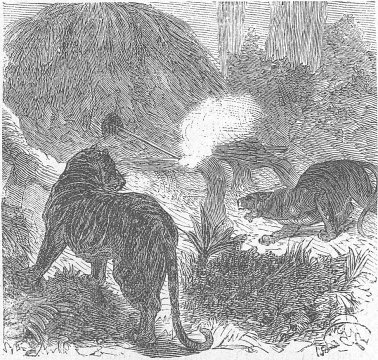
The poor child could not control her terror.
"Uncle Palmer! aunt!" she cried; "do you hear? Edward --- the tiger!"
But the planter and his wife had not lost a word of this conversation. Richard started up quickly; and Elizabeth, so weak a minute before, sprang trembling from her seat. "My boy! my Edward!" she cried.
"Hush, Elizabeth! hush, Anna!" said Palmer, with authority, although his voice was not so steady as usual; "there's some mistake, no doubt. Let me question the man."
And, addressing himself to the Chinaman in the strange jargon that serves for a common language to the inhabitants of New Drontheim, he asked him some peremptory questions. Yaw replied, still smiling and rocking himself, that about an hour before he had seen Edward and Maria going towards the forest, where signs of a tiger's presence had been noticed during the day.
"Stupid woman!" muttered the planter; "if anything happens to my son, she shall die under the rod."
"Maria did not want to go," answered Yaw; "Edward ran off, and the black woman went after him."
"But you, Yaw --- why did you not warn them that it was dangerous just then to go near the forest?"
"Yaw was far off, and he was busy getting in the betel. Work is gold, as the wise man says, and then little Edward is self-willed: he would not have listened to Yaw."
"You should have made them come back. Why did you not go into the wood after him?"
"Oh! oh! oh! the tiger would have eaten Yaw!"
"You stupid coward!" cried Palmer indignantly; "you deserve ---"
But casting a look at the foolish countenance of the Chinaman, he remembered whom he was speaking to; and, turning away with an air of disgust, he quitted the veranda.
He went into a room filled with all kinds of weapons, picked out a double-barrelled gun, and slipped a pair of horse- pistols into his belt. As he turned to go out, he perceived that his wife and Anna had followed him.
"Richard, where are you going?" asked Elizabeth.
"To look for this unlucky child; but most likely it is only some fresh frolic of Edward"s: don't be frightened."
"Richard, I will go with you!"
"And I will go, too!" cried little Anna. "I must go and help Edward."
Palmer could not repress a smile.
"What fine helpers you would be!" he said, shrugging his shoulders. "Come, Elizabeth, don't be foolish," he added, in a tone of authority; "I still hope that it will all end with a good scolding to this naughty boy and his rash nurse."
"At least, Richard, have the servants armed, and take them with you."
"Bah! that would be time lost, and then they are such cowards! only one would really be of any use to me, the Malay, Elephant-Slayer. Is he at home now?"
"No, uncle," said Anna, crying; "I saw him go down to the village just now to a cock-fight. And the other Malay, Opium-Smoker, has taken his flock of goats to the mountains."
"Well, then, I shall go alone."
"My dear, dear Richard!"
"My dear uncle!"
Anna and Elizabeth threw their arms round him. He was trying to escape from their embraces, when an inner door opened, and Mrs. Surrey entered hastily. Anna's mother was a lady of about forty, very kind, but as calm and sensible as Elizabeth was nervous and timid.
Palmer said to her quickly:
"You know what has happened, sister; take care of these poor things, and don't let them do anything imprudent; I promise you I will soon bring back the giddy boy who has been the cause of all this commotion. Now, don't let anyone go, I desire."
He darted out of the house, and was soon seen running down the avenue.
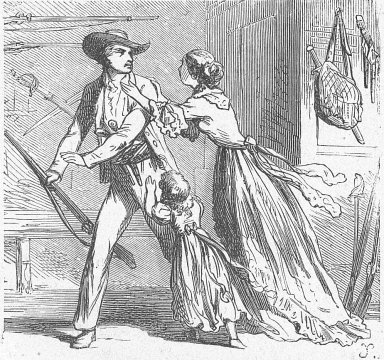
Elephant-Slayer belonged to the Batta race, a savage and warlike nation who inhabit the interior of the island, and are even now thought to be cannibals. He was entrusted by Palmer with the care and management of a herd of tame buffaloes; and his daughter superintended the milking. They both lived in a Sumatran hut in the farmyard. However, the duties assigned to Elephant- Slayer by Mr. Palmer were little more than nominal; for the greater part of the time the buffaloes, yoked to wagons or ploughs, were working in the fields, and when they came back in the evening they were taken care of by the other Malay, Opium- Smoker, to whom was also intrusted the care of the goats.
The real employment of Elephant-Slayer was that of hunter for his master's benefit. Armed with a long, heavy gun, he was in the habit of wandering about the surrounding mountains, and sometimes he even penetrated into the neighbouring forest and knocked down wild turkeys, pheasants, and deer, for food for the family. It had thus happened that he had killed several elephants, and, according to the custom of his country, he had added to his Malay name the surname by which he was known.
But he had even killed more tigers than elephants, and these victories had gained him an extraordinary reputation among his countrymen.
Among the Malays of Sumatra the grossest superstitions exist, and one of these superstitions consists in believing that the souls of their deceased ancestors pass into the bodies of tigers and this is why they call these terrible animals ninis, or grandfathers. With such a belief, they can have little taste for tiger-hunting, since they may always imagine they see a paternal or maternal ancestor in the ferocious beast they are about to strike. So these men, so brave and ferocious themselves, are rarely disposed to attack the ninis. Notwithstanding the ravages committed by these animals, superstition carries the day and they make no resistance. When a tiger enters a village, the inhabitants are even foolish enough to put rice and fruit before their doors, in the hope that these offerings may touch the feelings of their pitiless destroyer.
No Malay would therefore think of hunting a tiger, except in one particular case in which his religion allows it, namely, when a near relation of the hunter has been devoured by a tiger. Now Elephant-Slayer was precisely in this case; his own mother had been devoured by one of these monsters when she had been quietly resting one day before her door.
The fact having been well attested, he might now with a quiet conscience send a ball or a poisoned arrow at all the "grand-papas" that came in his way. Elephant-Slayer was gloomy and unsociable. He was taciturn, false, cruel, and vindictive; he had never been seen to smile, he had never addressed a single affectionate word to anyone. His daughter even did not seem to inspire him with any feeling of love; he treated her rather as a slave than as a beloved child whom he was bound to protect. He found no pleasure in anything but hunting wild beasts, in quarrels and battles, or else in games of hazard or betting. His great delight was in the cock-fights so dear to all Malays. He trained cocks himself whose sanguinary tempers he was constantly exciting, and he was seldom seen without his champion under his arm. Elephant-Slayer had never any pity for his fighting cock except when he gained the victory; then he dressed his wounds and bestowed the most assiduous care upon him. But, often, if the creature had been cowardly, or had been vanquished, the Malay did not hesitate to strike it with his kris, or to torture it with his own hands.
In outward appearance Elephant-Slayer, although full of vigour, was only of middle height and ill-formed. His complexion was copper-coloured, his forehead low and narrow, he had prominent cheek-bones, deeply set yellowish twinkling eyes. His nose was flattened, and from his wide mouth, which displayed teeth blackened and filed to a point, dropped continually that thick, red saliva, caused by the use of the betel nut. His dress consisted of a pair of striped pantaloons, reaching to his knees, and a vest with short sleeves which left his tattooed arms bare. A kind of scarf called a cayan sarong, and worn like a Scotch plaid, covered one of his shoulders. For a head-dress he had a coloured handkerchief rolled round his forehead, above which appeared some locks of rough, ragged hair. His legs and feet were naked. Two krises with jagged blades hung from his girdle, and completed his rude attire.
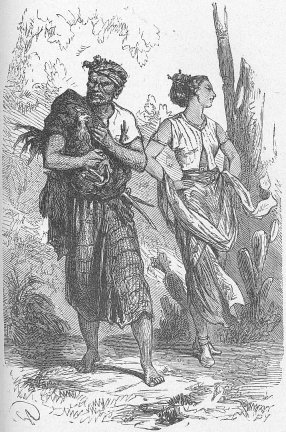
The violent emotions that had been awakened in him at the different stages of the struggle had left their traces on his face, for the slightest thing will arouse a storm in men of these fiery natures. At times his eye sparkled with ferocity at the remembrance of some episode in the fight, and a light foam still lingered round the corners of his mouth. However, these impressions were now giving place to an expression of triumph and satisfied eagerness. His daughter went along singing a dance air of a singular character, but not devoid of melody.
At the sight of Palmer the Malay stopped suddenly, not that he intended to show any mark of respect to his master, for that would be contrary to his habits of independence, but he guessed from the planter's look and the weapons he carried that something extraordinary had happened, and he was seized with the violent curiosity peculiar to the savage. Palmer told him in a few words the dangers to which Edward and the black woman were exposed.
This news touched Elephant-Slayer more than could have been expected.
"Edward! --- the tiger!" he answered in a hollow voice; "I must get my gun." And he wanted to run home, but Palmer stopped him.
"Your gun?" said the planter; "no, take mine, there is no time to lose; my pistols will do for me."
Elephant-Slayer did not hesitate; he gave the cock to his daughter, bidding her take care of the brave creature; then he seized the gun offered him by Mr. Palmer, and they set off quickly towards the plantations.
As to Légère, after having wrapt the precious bird in the folds of her sarong, she pursued her way home still singing. She had, however, understood very well that her father and her master were going to attack a tiger that had already perhaps devoured Edward and the black woman; but this seemed to her such a trifling matter that she did not think it at all necessary to check the expression of her gaiety.
We have said that Edward, though really a good boy at the bottom, was restless, unruly, giddy; that he was fond of any kind of bodily exercise, playing with bows and arrows and other weapons, and he delighted in dangerous adventures. All this charmed Elephant-Slayer; he discovered qualities in this noisy, frolicsome child that he considered likely to make a brave warrior. Besides, Edward, with that natural taste for cruelty that most children possess, and which was encouraged by his manner of life in this wild country, shared his passion for cock-fights, and tried every means in his power to get leave to witness the desperate battles which took place occasionally, when sometimes both of the feathered champions were left dead on the ground. Only a few months before he had made Elephant-Slayer a present of a young cock of a rare kind, which Major Grudmann, the governor of the island, had given him, and this cock had died very bravely on the field of battle. Such a gift had charmed the gloomy Batta more than a handful of Portuguese piastres or Indian rupees, and his affection for his young master had increased in proportion to the bravery of the deceased cock.
Without waiting to stand still, Palmer gave a shout every now and then, but no one answered. It was growing dark, and the silence of night began to prevail. The men were going home from their work, and no doubt the news of the arrival of a ship hastened their return to New Drontheim.
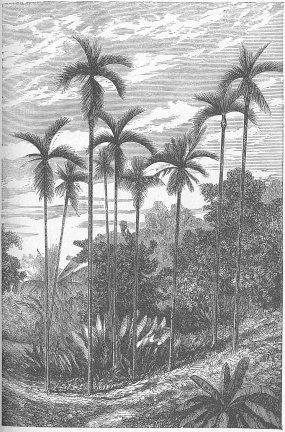
Palmer and the Malay continued to shout at intervals, but they were only answered by the echo; at last, however, as they approached the wood, they had the satisfaction of hearing voices answer theirs.
"There they are," said the planter, gasping for breath; "God be praised, we are in time!"
But this hope was premature; Palmer had not finished speaking when the distant cries assumed a different character, and then they were drowned by a frightful roaring that seemed to make everything around tremble instinctively. Richard and his companion seized their weapons; the planter turned pale, for, above his son's piercing cry for help, he heard the growl of a tiger.
"Let us run," he said.
They rushed forward at their utmost speed; but as they entered the forest they saw the black woman, Maria, running towards them in haste, leading little Edward. Both were shrieking with terror as if they were pursued by an invisible enemy.
At the sight of her master the young and nimble negress, with her clothes all in disorder and her eyes starting out of her head with fright, rushed forward, holding out the child towards Palmer, saying with a broken voice:
"Take him, save him! Little massa no hurt." And, yielding to the violence of her emotions, she fell almost fainting to the ground.
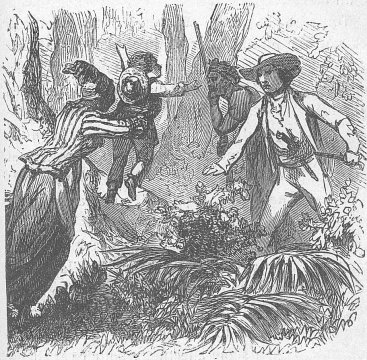
Edward, the most charming little rogue you can imagine, was supple, muscular, and tall for his age. Exercise had strengthened his limbs, and the heat of the climate had made him precocious. His open, regular countenance was sunburnt, his eyes were black and his eyebrows strongly marked; had it not been for his fair hair he might have been taken for a beautiful child of the copper-coloured race. His dress was very simple, and consisted of trousers, a short frock of white calico, and a broad-brimmed hat of plaited rushes fastened on his head by a string. Several little arrows with blunt points were stuck in his blue silk belt. Generally his movements were sudden and impetuous, and his way of speaking quick and lively; but now the mischievous child seemed quite scared: either the speed of his flight had made him giddy, or he had really been aware of his danger.
However, the poor father, on finding him again safe and sound, could not contain his joy; he lifted him up in his arms, pressed him to his heart, and kissed him passionately, saying half- reproachfully:
"You cruel child, what a fright you have given us! Have you no pity for your mother or me?"
Edward's only answer was a kiss.
But Elephant-Slayer, who had shown so much zeal in coming to the help of his master's son, had turned away from the forest, and, leaning on his gun, was quietly observing this touching scene, though he had not a word, not an affectionate look for this little favourite whom a moment before he had considered lost. He only spat out an enormous piece of betel, and, drawing out his box of siri, he took a fresh dose, which he chewed very complacently. Perhaps this was his way of showing his satisfaction, and of congratulating his patrons on the happy result of the adventure.
Palmer, after the first burst of affection, put the child down; and then, looking sternly at the woman seated on the grass, who was hardly beginning to recover her senses, --- "Maria," he said, "do you know that you deserve a very severe punishment for this careless conduct?"
"Oh, massa, good massa, not me! -- Him --- little massa Edward."
And the child hastened to take his nurse's part.
"Papa," he said, very soberly, "do not scold poor Maria, she was not disobedient; scold me, only me. Listen. Mamma said we might go to see the betel gathered; and I went with Maria. I took my bow and arrows to shoot the birds in the rice-fields. But what has become of it? where is my bow?" added the little boy, looking about him uneasily; "I must have let it fall in the wood."
"Never mind," said Palmer impatiently; "we will find it, or you shall have another."
"Oh, but I have never had such a splendid, large bow --- Well, then," he added, continuing his tale, "we got to the plantations, Maria and I, and I was looking for birds in the rice-fields when we met the negro Daritis --- you know Darius,your valet --- and he said to me, 'Massa Edward, have you seen the great flower, down in the wood, at the foot of the old bombax? It is so very big that you might easily lie down inside it.' Then I thought I should like to see the great flower, and I told Maria; but Maria did not want to go, and I ran away. She called me, and I ran away all the faster. I knew where the bombax was, and was determined I would see the great flower. Maria began to run, but I could run faster than she could; I met some of the Chinamen who were going home with the waggons, and then I ran away into the forest."
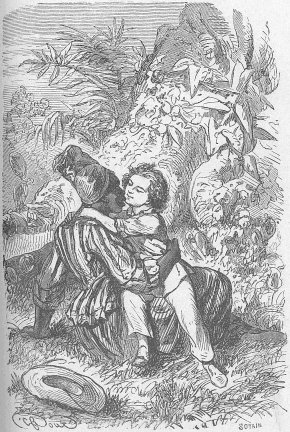
"Oh! did they know there was a tiger there? I did not know it, and Maria did not. Darius wanted to follow; but Maria was angry, and sent him away. She went into the wood after me, but I hid myself. I was determined to see the great flower, and I was hoping that Maria would get tired of looking for me, and would go away; but she would not go, and kept looking for me and calling me. When she had gone a little way off, I got up and ran to the bombax, and at last I found the great flower. And then I answered Maria, who was crying --- she was crying. . . . O Maria, come and let me kiss you!" added the pretty boy, throwing his arms round her neck; "I am so sorry I vexed you." Palmer listened attentively to this little tale, and seeing that the nurse had not been at all to blame, asked her in a milder tone:
"Maria, is all this quite true?"
The poor negress, who was looking quite delighted with Edward's eloquence, and was listening to him with her mouth wide open, answered, half-laughing, half-crying:
"Massa Edward talk better than Maria, and it all be quite true. But little massa no say anything of tiger yet!"
"Yes, yes," answered the planter, shuddering at the remembrance; "did not a tiger run after you? I heard him roaring: how did you get away from him?"
"Oh, yes, we did see a tiger," continued Edward carelessly. "We were looking at the beautiful big flower, and all at once we saw a tiger in the brushwood a few steps from us, and he did frighten me, though he was such a pretty creature. Then Maria began to scream, and I cried too, but the tiger cried louder still. He was just going to spring upon us, when a big hairy man, such an ugly fellow, darted forward at the foot of the bombax and hit the tiger with a great stick that he had in his hand. But I did not see the fight, for Maria seized hold of me and dragged me away, running as fast as she could. I dare say I lost my bow there; but I'll find it again." Palmer looked much astonished.
"What does he say?" he asked Maria, "a man bold enough to strike a tiger with a stick! The poor fellow must have been eaten up!"
"No, no, massa; me think the tiger he dead."
"A tiger killed with a stick! it's an absurdity, my poor Maria; and who would be rash enough to do such a mad thing? Did you know him?"
"No, master; but he be very big, very strong. He be one of those men 'who do not talk.' "
Palmer did not understand what she meant, and asked her many more questions; but all he could get from her was that her deliverer was one of those men who cannot or will not speak.
"And he was hideous l" added Edward, by way of commentary.
The planter thought over the story again and again, trying in vain to understand this strange adventure. At length he turned to Elephant-Slayer, who had remained unmoved chewing his betel, and asked him if he were inclined to continue the chase.
"The nini's dead," replied the Malay coolly.
"Dead! How do you know that?"
Then Elephant Slayer explained that the prolonged roaring that they had heard a few moments before had suddenly ceased, which proved that his strength had failed the ferocious beast all at once.
Although Palmer had the greatest confidence in his companion's experience in such matters, he shook his head.
"Well, we must be clear about it," he answered; "for I cannot leave such a brute alive near my house. Elephant-Slayer, we are well armed, and we will go and see if the tiger be really dead. You, Maria," he continued, addressing the woman, "go home quickly with Edward; do not let him get away from you again. Do not stop on the way, for the ladies, particularly my poor wife, must be half dead with fright."
Maria, who adored her mistress, prepared to obey at once, and took Edward's hand to lead him away, but the self-willed little man resisted energetically.
"No, no!" he answered, in a determined tone; "I am with papa now, and there is nothing to be afraid of. I want to see the big flower again, and the hairy man who beat the tiger with his stick --- and then I shall find my bow, too. Dear papa, won't you, won't you, dear good papa, let me go with you and my friend Elephant-Slayer?"
Palmer tried to make the wayward child listen to reason; but, as he could not succeed, he consented to keep him, and send Maria home alone. He needed some one to show him the way, and Edward could do that. Then, for fear of accident, he took the little rebel, who would have much rather walked, in his arms, while in his other hand he carried a pistol. Having taken these precautions, he despatched Maria, bidding her tell her mistress that he should be home soon, and then plunged into the forest, followed by Elephant-Slayer.
The least noise, the breaking of a dry branch under the hunters' feet, the flapping of a bird's wing in search of its resting-place for the night, awakened a thousand confused and plaintive echoes. The child pointed out the tree they were in quest of. But he did not chatter as usual; the solemnity of this solitary place seemed to affect even his lively and restless nature.
The ground was uneven and encumbered with the stumps of great trees, which had thrown out vigorous shoots, with cacti and gigantic ferns. Palmer walked slowly, looking carefully at each tuft of grass, and keeping firm hold on his son.
The Malay himself seemed to have comprehended the necessity of being on his guard; he drew the handle of his kris from the folds of his dress, and loaded his double- barrelled gun; but, instead of looking carefully on the ground as his master did, he examined the tops of the trees, as if he suspected that some danger might come from them.
They soon found themselves at the foot of the old bombax, where the still unexplained deliverance of the child and the nurse had happened. This tree was one of those gigantic specimens of vegetation, of which nothing that grows in our northerly regions can give us the least idea.
Under its shade grew a plant no less extraordinary, and which might, though for different reasons, have claimed equal attention with it. This was the colossal flower which had excited Edward's curiosity. The Malays call it krouboul. It had neither leaves nor stem, and rested on the ground itself; its colour was a reddish white; each of its petals was more than a foot long, and the whole flower was more than ten feet in circumference. It was a giant among flowers, as the bombax was a giant among trees. Unfortunately, this splendid corolla had a very disagreeable odour; God, while He gave it grandeur and beauty, seems to have kept sweet perfumes for less favoured plants.
Edward, at the sight of this botanical phenomenon, found his tongue again, and tried to free himself from his father's hold, to roll himself, perhaps, on the white petals of the krouboul, as on a bed of satin. Palmer, on his part, would not have failed, under any other circumstances, to admire this splendid specimen of the Sumatran flora; but he knew that they were in real danger; and, after casting one absent look on the flower, continued to examine the inequalities of the ground near. As to Elephant-Slayer, he did not appear to be uneasy about what he might find at his feet, and scrutinized the branches of the old bombax with minute care, as it rose like a pyramid of verdure above his head.
All at once Palmer uttered a cry of alarm. In a hollow place, between two projecting roots, he perceived an enormous tiger, crouching as if he were about to spring upon them. He pressed his son to his heart, and was on the point of pulling the trigger of his pistol, when the Malay said to him coolly: "Do not take the trouble --- I was right. The nini is dead!"
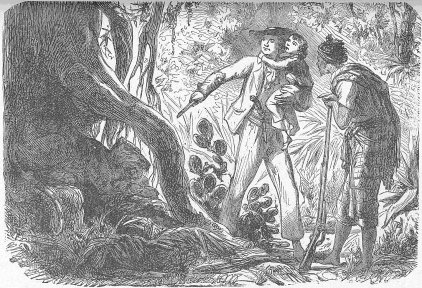
While Palmer was trying to account for this sudden death, the Malay made him place his hand on the tiger's back. They could feel through the skin that the back-bone was completely smashed. Then Elephant-Slayer made him touch the animal's head; the skull-cap, although it was as thick and hard as a slab of marble, had been crushed in such a way that the bone and the brain seemed reduced to mere bloody pulp. Lastly, in order to complete his demonstration, he pointed out to the planter a thick branch, that had been left by the side of the tiger, and must have been the instrument of death. It was a formidable club, broken off from a casuarina or iron-wood tree, and yet it had been broken by the violence of the blow.
Palmer, greatly astonished, and quite unable to reject the evidence, said:
"I shall never believe that a man can have given such blows; no human power could have killed a royal tiger in this way."
"Orang-outang!" answered the Malay laconically.
This word was like a flash of light to the planter. Then he remembered the marvellous tales that were told of the incredible power, agility, and intelligence of the great apes called orang-outangs by the Malays. He understood at last what Maria had meant by declaring that the tiger had been killed by "one of the men who do not talk;" for, with the negroes, as well as with the Malays, the chimpanzees of Senegal and the orangs of Borneo and Sumatra are only idle men, who have run away into the woods that they may not be made to work. Although Palmer had often heard that there were orangs in the country, it was the first time that any of them had been seen so near New Drontheim.
"What!" exclaimed Palmer, astounded; "I owe my son's life to an orang-outang?"
"An orang-outang!" cried Edward, in his turn. "How I should like to see it! I had no time to look at it, Maria dragged me away so quickly. He is ugly, but he is not wicked, for he killed the tiger that was just going to eat us. I must see the orang-outang."
But Palmer now understood why the Malay had looked at the trees so constantly, and there was reason to think that the conqueror of the tiger was not far away. Night was coming on, the wood was already dark, and the orang is never more formidable than when he is invisible; at the most unexpected moment the hunter drops with a broken head, without having even suspected that the sturdy enemy that has struck him was near. Palmer remembered all this, and his anxiety for his child was again aroused. Taking him up in his arms again, he said, in a stifled voice:
"Poor child! you do not know what you ask. If the stories they tell are true, you need never want to see the horrid creature near."
"What, papa! is it really an animal?" asked the child innocently. "Maria is always talking about these orangs, and she says ---"
"Humph!" said the Malay, behind them.
Palmer turned round quickly. Elephant-Slayer pointed with his finger to an object at a considerable height on the old bombax.
"There! there!" he said, in a low voice; "do you see it?" But neither father nor son had sufficiently practised sight to be able to distinguish anything at that height. The perfect labyrinth of leaves and branches on the colossal tree bewildered them, and they could not follow the line pointed out by the Malay. At length, however, there was a sudden movement in the leaves, and a kind of dull sound, issuing from the same spot, served as a guide to them.
At the point where two great branches separated appeared a savage, bearded face with piercing eyes, for there was still light enough in the sky to render it distinctly visible. Its body was concealed; nothing but that broad, impassive countenance could be seen, following with its eyes every movement of the persons below, and seeming to threaten or defy them. Elephant-Slayer raised his gun to his shoulder; but Palmer instantly struck it down, saying authoritatively:
"Don't shoot; I forbid you. However dangerous the orang may be, it has saved my son's life and Maria's: I will not allow the least harm to be done to him."
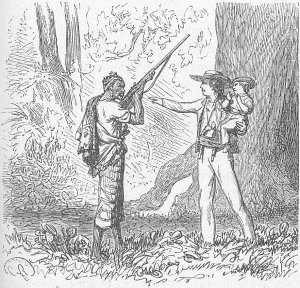
Perhaps the orders of father and son would have availed little had the indomitable Malay quite made up his mind for the attack. At first he did feel angry and inclined to rebel when his master turned aside his gun; but he restrained himself and answered:
"I did not mean to shoot, but only to frighten the orang. He is too high up, and this gun is too small. I shall fetch my own gun, and my lance, and poisoned arrows."
"I forbid you," said Palmer vehemently. "Remember, Elephant-Slayer, if you do any harm now or by-and- bye to this ape that has rendered me so great a service, I shall know how to punish you."
The Malay was incapable of appreciating the generous sentiments of his master; but he made no reply.
In a few minutes Palmer added:
"There is nothing more to be done here; let us go home as fast as we can. I shall not be easy till Edward is out of reach of the orang. Mind, Slayer, listen to me; do not provoke him; it would be dangerous to attack him."
Possibly the hunter shared this opinion, though the danger of the enterprise was its great attraction in his eyes. Palmer continued:
"The tiger belongs to you; you can come and fetch it tomorrow morning with one of your comrades; and I dare say Doctor Van Stetten, who is interested in natural history, will give you more than one gold rupee for the skin."
The thought of this present had a great effect on the Malay, and changed the course of his ideas. Slayer tried to lift the enormous creature on to his shoulders; but he could not succeed. He left it in the place where it was, intending to return for it another time, and then they set off towards home.
Edward, self-willed as usual, tried to resist; he persisted in looking for the bow that he had lost; but already the twilight, always so short in tropical countries, was over, and the stars had begun to shine. Not to mention the proximity of the formidable orang-outang, there was too much danger in such a place to make it prudent to remain longer there, and they gave no heed to the spoilt child.
The creature was still showing his hideous face at the top of the bombax, and, as they walked away, he watched them with fierce curiosity. They had hardly gone twenty paces when they heard a great noise among the leaves, and at the same time a hoarse, guttural, very peculiar cry. They turned round once more: the orang had just raised himself up, and his grotesque form, hanging by one of his long arms from a branch, stood out in black outline against the sky.
A few minutes later and Edward was receiving the caresses of his mother, aunt, and cousin; and, with the artless prattling of a child, was relating to them at great length all that he had seen, done, and said during this eventful evening.
Légère, Elephant-Slayer's daughter, was busy milking the buffalo cows under the posts on which her cabin was built, and she was filling several pans with a rich, sweet milk said to be delicious. The Chinese, under the direction of Yaw, were proceeding in silence towards the rice-fields; while the noisy, chattering negroes were bustling about the sugar and indigo magazines. But the cheerful aspect presented by a farm in Normandy on a fresh autumn morning, when the labourers are starting for their daily work, was wanting.
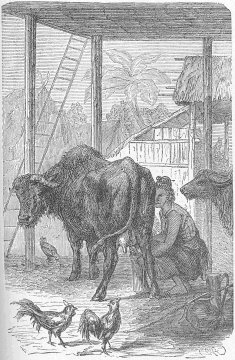
After having given orders to some of the servants, and reproved the idleness of others, Palmer was just setting out for the village, when an exclamation in Dutch and a sound of some one panting for breath were heard through the mist, even before the planter could see who was coming. At length the mist cleared away a little, and Palmer found himself face to face with a short, thick man, dressed after the European fashion, who, though it was still so early, seemed to be going to the house.
This individual, a placid, benevolent-looking person, was just then in a great heat, all red and puffy, and panting like a buffalo at bay. He wore a cocked hat, and a faded uniform much too tight for him, while knee-breeches of cloth and coarse woollen stockings completed his dress, which, it must be confessed, was one little suited to the exigencies of a climate like that of Sumatra. The visitor had taken the precaution of carrying his wig, which was powdered with rice-flour, at the end of his umbrella, and yet it was evidently quite time he reached the end of his journey, for he was almost stifled. To add to his misfortunes, the mist, by clinging to the glasses of his great green spectacles, prevented him from seeing where he was, and when he did reach the court-yard, he turned round and round two or three times as if seized with giddiness.
This unlucky visitor was Mynheer Avenarius Van Stetten, Surgeon of the University of Leyden, member of several learned societies, and appointed to superintend the health of the Dutch troops in garrison at New Drontheim.
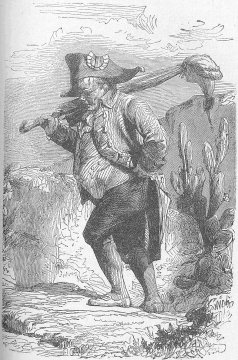
The doctor tried to answer, but his voice failed, and he allowed himself to be led into a low and, comparatively speaking, cool room. He dropped into a chair, which creaked beneath his enormous weight. However, when Palmer had made him swallow a couple of glasses of excellent cognac, one after another, he began to recover; he drew a long breath, put his wig on his bald head, and having coughed once or twice to clear his throat, said:
"A thousand thanks, Mr. Palmer; you have a famous fog-expeller. Upon my word, I like it as well as our Hollands, which I used to taste now and then at the tavern of the 'Three Kings' when I was a student at Leyden, and we were obliged to work in the anatomical theatre in a cold of ten degrees below freezing point. Ah, who would have thought that I should have missed the ice and snow so much!"
The planter pressed him to take some more; but Van Stetten stopped him.
"No, no," he answered; "have a pity on my poor head. I am not so strong as our old Professor Pomponius, who would toss off a dozen glasses while the clock of St. Peter struck twelve." Doubtless the remembrance of his own country and his young days revived the good doctor, for he did not seem inclined to leave the subject when Palmer asked him:
"You are come to see your patient, are you not, my dear Van Stetten? She is not so well as I could wish; just notice how weak and languid she is, please. As it is still so early, I do not suppose she is up; but I will have her told that you are here ---"
He was going to ring the bell, but Van Stetten stopped him.
"Do not wake her," he said hastily; "a quarter of an hour's sleep will do more for our charming invalid than the prescriptions of the whole Faculty. I will see Mrs. Palmer, my dear sir, before I leave the house; but to speak the truth, I should not have been so unwise as to pay you a visit at such an hour if considerations of a pressing nature ---"
"Something about natural history, I venture to say," said the planter, smiling; "I could have guessed when I saw Doctor Van Stetten braving the cabout that there were plants, insects, or rare quadrupeds in the question."
The good man drew himself up and looked vexed. "That is ingratitude, Mr. Palmer," he replied, "yes, black ingratitude, and you know it well. When I went through the sun, up the mountain that day when you broke your leg in climbing a ravine; when I came here through a frightful monsoon to see Edward when he had had a bad sun-stroke, it was nothing to do with natural history, and I might have expected ---"
"I was wrong, Van Stetten, my good friend," interrupted the planter, squeezing the doctor's hand; "you are the best fellow in the world. I was wrong, I say, and I beg your pardon. Well, we will talk of flowers and animals as much as you like; but, first of all, satisfy my curiosity about the ship that anchored in the river yesterday evening. Do you know what she is, and what she is going to do here?"
Van Stetten answered without the slightest temper:
"What! don't you know, Palmer? It is the schooner Gertrude, captain Van Roer, from Batavia; he has come here for his cargo of spices. When he goes back I shall send my specimens by him to Batavia, and from there they can be sent to my dear native country. But you will soon see the captain. He seems in a great hurry to lade his ship, and of course he will come first to you, the richest planter in the country, to buy the spices he wants. Now I have answered your questions, let me ask a few in my turn about the escape that my little friend Edward had yesterday."
"Ah, ah! you have heard of his adventure already, doctor," answered the planter; "the news has spread quickly."
"They were talking of nothing else last night in all the huts of New Drontheim; one heard of nothing but tigers, orang-outangs, and wonderful flowers, quite enough to put a humble lover of science like myself on the alert."
Palmer satisfied the doctor's curiosity. When he spoke of the gigantic flower that had attracted the child into the forest, and of the magnificent royal tiger found dead at the foot of the old bombax, Van Stetten manifested his surprise and delight by enthusiastic exclamations. But when Palmer told how an orang- outang had killed the formidable tiger with blows of his club, the savant could no longer contain himself. He sprang from his seat, and, in spite of the heat which made every movement an exertion, he began to stride up and down the room, saying with great animation:
"I have certainly heard of these monstrous apes of the order of primates doing extraordinary things, as if they were almost possessed of reasoning powers; but I could never have believed --- And one of these singular creatures is in this neighbourhood now? I must see it and study it. How lucky it will be if I am able to discover some new scientific facts about this strange creature and send its skin to Europe, where it is almost unknown. I should present the skin to the museum at Leyden, and it would figure there with this inscription in large letters: Presented by Dr. Van Stetten, of Leyden. What an honour and glory! It would immortalise my name. But as you will not let anyone try to kill this orang, I reckon at least on studying it closely; I shall spend my time in that part of the wood where it was seen."
"Take care, my good fellow, that you do not add to the number of the martyrs of science. The forest is very little frequented, as you know, and the animal you want to make observation upon is not the most tractable in the world. People say that an orang, armed with his club, is not afraid of ten strong men, and I can well believe it now, after what I have seen of his doings."
This remark seemed to cool Van Stetten's ardour a little. He sat down again, wiping his face with his handkerchief.
"Really," he replied, "I have heard say that an orang could defend himself even against an elephant. And what is more, he gives such proofs of intelligence that the people of this country look upon him as belonging to a particular race of men who cannot talk. I will take care, as you say, not to add to the number of the victims of science; but I must not delay any longer in going to look at the gigantic flower; as to the tiger ---"
"You have no need to disturb yourself about the tiger, doctor," said Palmer, pointing to the window, which was covered with a transparent curtain; "for here it is coming to you."
In fact, Elephant-Slayer and another Malay called Opium- Smoker were entering the court at that moment; they were carrying, suspended from a wooden bar, the body of the ferocious beast, which they had fetched very early in the morning from the forest.
They placed their burden under the shadow of a clump of citron and banana trees; the people of the house ran directly to look at the monster, the hero of all their conversations since the evening before.
A few Chinamen, negroes and negresses, and among others Maria, did not dare to approach, although they knew that the enemy was as dead as a door-nail. The Malays, on the contrary, full of contempt for their cowardice, thrust their naked feet into the tiger's mouth, as if they would like to arouse his ferocity again.
Opium-Smoker, who had been helping Elephant-Slayer, was dressed almost exactly like his companion, except that instead of a handkerchief rolled round his head he wore a queer-shaped hat made of rushes; his face, naturally hideous and ferocious, had that livid, leaden complexion, that besotted stupid look which the habit of smoking opium produces. In truth, all his earnings were spent in buying this fatal drug; and the little peculiar pipe, hanging from his belt near his kris, showed that he was always ready to give himself up to his favourite passion. Happily for him, opium was dear and his purse very often empty. If it had not been for this he would have fallen a victim to this wretched mania a long time before, or else he would have had one of those fits of frenzy to which opium-smokers are liable. During these fits they issue from their houses, throw themselves, dagger in hand, on passers-by and kill them, if they are not on their guard; on their part, the passers-by are allowed to attack them and strike them dead like wild beasts. Such was the fate that awaited Opium-Smoker, and the certainty of this inspired the inhabitants of New Drontheim with a horror of him, not unmixed with disgust.
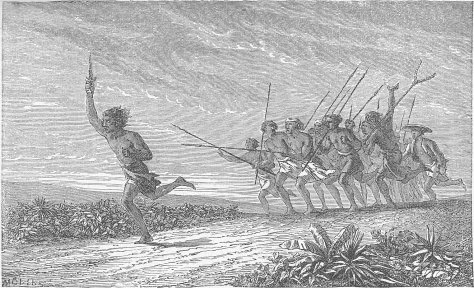
Van Stetten, as you may believe, hastened out, protected from the sun by his enormous umbrella; while Palmer, either more robust or more used to the climate, contented himself with the shade of his large hat made of the bark of a banana tree. As they approached the group collected round the tiger, Edward, still in his morning dress, came out of the house, dragging by the hand his pretty cousin Anna, who tried to resist and turned away her head frightened. The giddy boy ended by leaving her, and after having kissed his father and the doctor, began to play with the tiger's long tail, and almost won a smile from grave Elephant-Slayer. But Anna did not seem reassured by his boldness, and it was only when she had taken refuge behind the negress that she dared to watch the bravery of her valorous cousin.
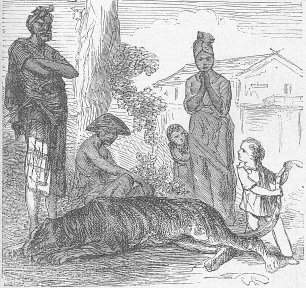
"However," he added coolly, "he seems to have taken up his abode in the neighbourhood of your plantations, and if he is not dislodged pretty speedily he will kill some of your labourers, you may depend upon it."
"Very well," answered Palmer, "we must manage to make him decamp and return whence he came. We will go, a good many together, into the part of the forest where he is and make a great noise; that will be enough, I dare say, to frighten him and make him run away. Meanwhile, I forbid my men to shoot balls, arrows, or darts, at this orang, --- you hear me, all of you, don't you?"
At this moment Doctor Van Stetten started up in great consternation.
"Mercy," he cried, "the tiger's bones are smashed; it is impossible to study his anatomy. The skin is all right, however, and a very splendid one; it will make a fine figure among my specimens."
"It is only for you," said Palmer, "to buy it of its owners."
"With the greatest pleasure; what are their terms? Act as our interpreter, Palmer, for I do not understand a word of their abominable lingo."
The planter asked the two Malays what price they put on the tiger. Opium-Smoker's reply was prompt and brief. Elephant- Slayer, chewing his great lump of betel all the time, set forth his claims at much greater length. At last Palmer said in Dutch to the doctor, who was awaiting the result of the negotiation with impatience:
"I knew beforehand what Opium-Smoker would demand. You are a doctor, and your surgery is well furnished with drugs; he asks of you some doses of opium to intoxicate himself."
"He shall have it; but is not the poor fellow stupefied enough already? Does not he know that opium is a poison?"
"He will not listen to reason, any more than the drunkards of other countries, and your sermons would be lost on him. As to Elephant-Slayer, he will not only consent to cede you his share in the tiger, but he will skin the animal very skilfully, on condition ---"
He stopped, laughing.
"Go on," said the savant.
The condition is so odd! You will be vexed, perhaps. In fact, he demands that you should bestow your attention on one who is dangerously wounded."
"Dangerously wounded! Is it not my duty to help all who are suffering?"
"Undoubtedly, but this is a peculiar case. In two words, doctor, Elephant-Slayer wishes you to dress the wounds of his favourite cock, a splendid fighting-cock, that received, it seems, a bad wound in yesterday's fight."
Van Stetten gave such a jump, that his heavy green spectacles tumbled over his nose, and his wig turned round on his bald head, casting a cloud of rice-powder all around.
"A plague take him and his cock!" cried he; "does he think that a graduate of the university of Leyden, a licentiate of natural sciences, a doctor of medicine, a corresponding member of the Linnean Society, of the Academy of Berlin, etc., is going to degrade his art by doctoring a spiteful fowl?"
"As there is no university in the forests of Sumatra, I should try in vain, my dear Van Stetten, to make this wretched Malay understand your scruples. As for him, he much prefers his cock to his daughter, and he may think you very much honoured by such a task. Take care; if you refuse his request, he will very likely refuse you his share of the tiger."
"Well, then, if I must give in, I must. I will dress the cock's wound."
The bargain was then concluded, and while the two Malays carried the tiger to a shed near, where they could skin it, Légère, at a sign from her father, fetched the wounded cock.
The doctor was compelled to draw out his case and dress the wounds of the warlike bird, which testified its gratitude by giving him several sharp pecks with his beak.
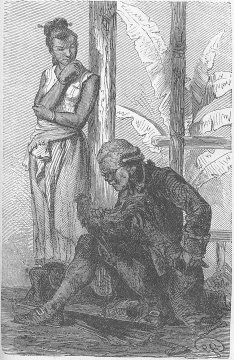
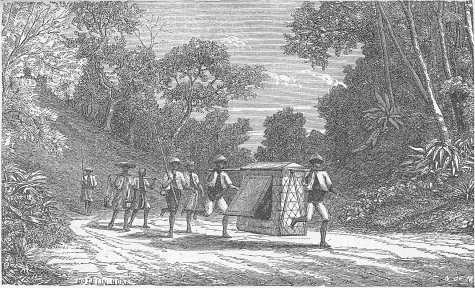
Comments/report typos to
Georges Dodds
and
William Hillman
![]()
![]()

![]()
BILL
HILLMAN
Visit
our thousands of other sites at:
BILL &
SUE-ON HILLMAN ECLECTIC STUDIO
ERB
Text, ERB Images and Tarzan® are ©Edgar Rice Burroughs, Inc.-
All Rights Reserved.
All
other Original Work ©1996-2007 by Bill Hillman and/or Contributing
Authors/Owners
No
part of this web site may be reproduced without permission from the respective
owners.